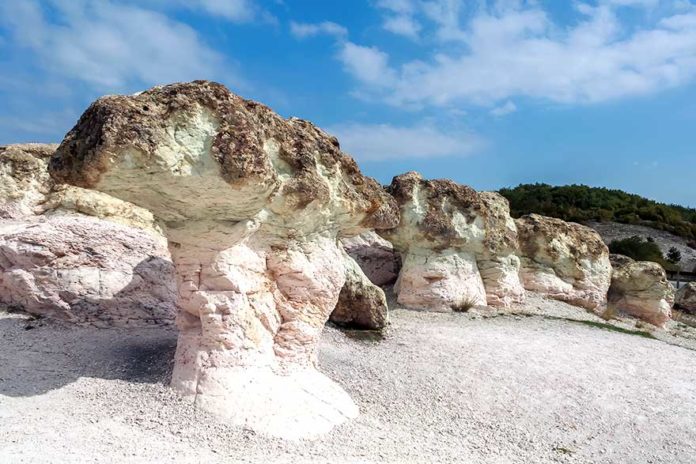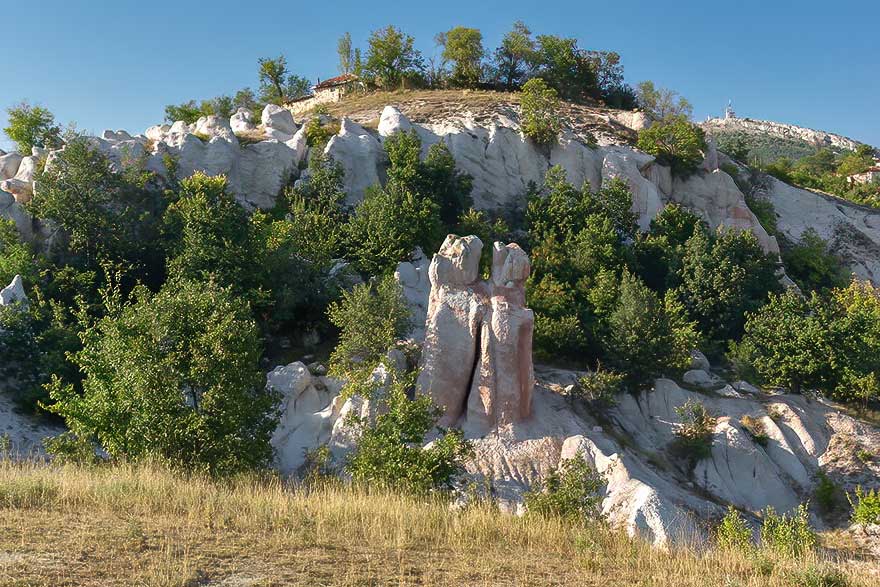In the southern reaches of Bulgaria, near the village of Beli Plast, stands a spectacle that transcends the bounds of human creativity. Scattered across the landscape, you will find an army of lifelike statues that defy reason and stir the imagination — the Stone Mushrooms. Crafted by nature’s deft hand over millions of years, these geological masterpieces inspire resilience and endurance.
A Mystical Wonder
Each stone mushroom embodies a sense of mystical wonder, representing nature’s mysterious ways. These wonders of the natural world didn’t appear overnight or form with any real intent. They result from a ballet, a slow dance of erosion and weathering that has spanned millennia. Wind, rain, and the relentless passage of time have all played their part in this delicate choreography, sculpting the rock into the mesmerizing forms we see today.
These silent stone guardians of the landscape, each with a unique shape and size, bear witness to the beauty of persistence. With stems of softer rhyolite tuff, capped by more complex andesite layers, they’ve stood unyieldingly against the ravages of time; their resilience mirrored in their mushroom-like silhouettes. In a world where change is the only constant, these stone mushrooms have adapted, standing tall against all odds.
Composed of Rhyolite and Andesite
The Stone Mushrooms are a remarkable geological phenomenon sculpted over millions of years. They are primarily composed of two types of volcanic rock – a softer, easily eroded base of rhyolite tuff, topped by a resistant layer of hard andesite. These natural formations stand 2.5 to 3 meters tall, with caps reaching 3 meters in diameter. The selective erosion process, known as differential weathering, has led to their unique mushroom-like shape. Over time, the softer rhyolite tuff was worn away more rapidly by wind and water, leaving behind the more rigid andesite layer atop slender stone stems – a remarkable testament to the enduring power of nature.
More Than Just a Geological Formation
The stone mushrooms of Beli Plast are more than just geological formations; they are symbols of unwavering resolve, proof that endurance yields its kind of beauty. Their existence teaches us a poignant lesson: that in the face of persistent challenges, strength can take form, and resilience can carve a path to survival.
Much like the stone mushrooms, each of us has the capacity for resilience etched into our spirits. We, too, face the winds and rains of adversity, challenged to stand firm, adapt, and endure. These stone mushrooms, so steadfast in their silent vigil, remind us of the power of perseverance and the strength to stand our ground, no matter the obstacles we face.
Their silent endurance has a profound grace, a subtle reminder that resilience doesn’t always roar. Sometimes, it stands silent in a field, unbowed and beautiful, like these stone mushrooms in the heart of Bulgaria. They teach us that persistence can shape our lives in the most incredible ways, just as it has shaped the landscape of Beli Plast. In a world that often seems hurried, these stone mushrooms invite us to pause, look, and learn.
Let us take inspiration from these monuments of nature’s patience. Let us weather our storms with grace, stand firm amidst challenges, and carve our paths with enduring resilience. Just like the stone mushrooms of Beli Plast, may we, too, stand as a testament to the beautiful ballet of resilience.




